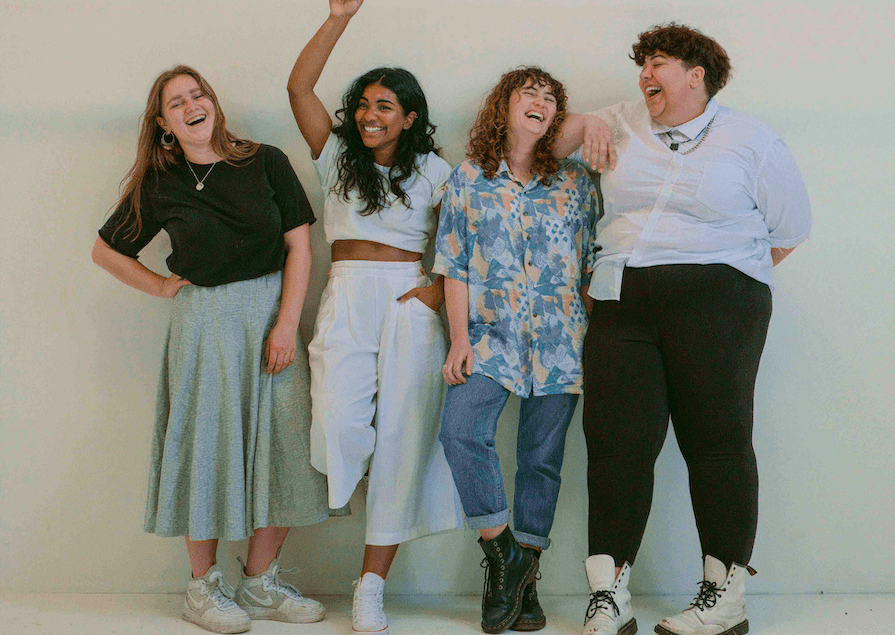Where next with the body positivity movement?
In the past decade, social media has transformed the body positivity movement. It has become far more accessible, and it has helped me accept my body. But I am an able-bodied, cisgender, white woman. My journey towards body positivity has mainly been focused on issues of low self-esteem. For more marginalised individuals, body positivity is surrounded by deeper questions of survival within a society that refuses to defend them.
So, what needs to change in our understanding of the body positivity movement? And how do we refocus this movement and give representation to those who have been sidelined?
When it began, the body positivity movement was radical. It was started by individuals who were tired of being discriminated against because of what their bodies looked like.
Stephanie Yeboah, an inspiring body positivity activist, hugely influenced the better-known activist Jameela Jamil’s campaign for self-acceptance.
Yeobah said that “body positivity began as an inclusive, diverse, intersectional endeavour dedicated to celebrating and uplifting fat bodies.” But Yeboah and many other body-positive activists are unhappy with the way in which the movement has progressed.
Body positivity tells us that your body deserves to be cared for and valued as it is right now
It might be said that the movement has been ‘white-washed’ and commercialised. It often centres on able-bodied, cisgender, white women who happen to have curves in “all the right places.”
Celebrity ‘fitness gurus’, such as Louise Thompson, have been called out for appropriating the term ‘body positive’.
Former Love Island contestant Alexandra Cane, who found her ‘happy body’ through losing two stone, calls herself an advocate of body positivity. Although I am sure Cane’s intentions are good, this is problematic in a number of ways. The notion of finding your ‘happy body’ through weight loss wholly opposes the point of the body positivity movement.
Despite misconceptions, the body positivity movement does not promote obesity or an unhealthy lifestyle. As Danielle Young from Essence Magazine says, body positivity is the “revolutionary notion to embrace and appreciate your body in whatever state it is in right now.”
The idea of losing weight and finding your ‘happy body’ suggests that you can only be happy once your body is a certain weight. Body positivity tells us that your body deserves to be cared for and valued as it is right now, because all bodies have value.
We also need more visibility for people with disabilities
I do not want to minimise Cane’s personal struggles and experiences with fat-shaming. Of course, it is hideous that she experienced such internal struggles as a result of people’s body shaming. Nor am I saying that because she has lost weight, she can no longer talk about body confidence and inspire others. But celebrities like Cane need to be careful that they don’t drown out the voices of people who are more marginalised within society.
Alexandra Cane’s appearance on Love Island, where she had a status as the ‘curvier’ contestant, reveals how low the bar is set in terms of representation within reality TV and popular culture.
Shows like Love Island uphold the harmful myths that anyone who does not fit into society’s small box of what is ‘attractive’ is therefore unworthy of love. I would recommend watching the queer-friendly and relatively diverse Season Eight of Are You the One. But even so, it still leaves a lot to be desired in terms of representing plus-sized bodies.
The body positivity movement needs to re-focus its attention onto marginalised bodies that deserve to be represented and celebrated in society. And the language used when discussing body positivity need to be reconsidered.
It is time for many of us to rethink our position and perception within the body positive movement
Sam Dylan Finch, a trans-activist and writer, highlights the importance of inclusive language within the body positive movement. Finch gives examples of ‘empowering’ body positive affirmations and draws attention to how these affirmations do not always encompass the lived experiences of transgender and non-binary individuals.
We also need more visibility for people with disabilities, as a means towards ending the stigma around disability and broadening our perceptions of body diversity. I spoke to Youtuber Emily Nicole Roberts, who pointed out that when her disability is often viewed in a comical or negative light it makes it “hard to be positive about [her] body and it’s capabilities”.
She pointed out the lack of representation for people with disabilities in mainstream media. However, she spoke of finding strength and self-love through her disability, as “it pushes [her] to be the best version of [herself]”.
So, now we have entered a new decade, it is time for many of us to rethink our position and perception within the body positive movement. Let’s just say if your idea of body diversity looks like one of those Dove adverts with hourglass-shaped women standing in a line, we are far from where we need to be.
We must expand our notions of body positivity and truly embrace all types of bodies and people
As someone who has battled with body image, I find social media movements that focus on a more caring and accepting attitude towards our bodies very healing. But we need to stop watering down radical movements, ignoring the important message behind them, and using them to instead promote damaging diet culture.
We must expand our notions of body positivity and truly embrace all types of bodies and people; all bodies are worthy of care and have value, but some need more of a spotlight upon them than others.

Comments (1)